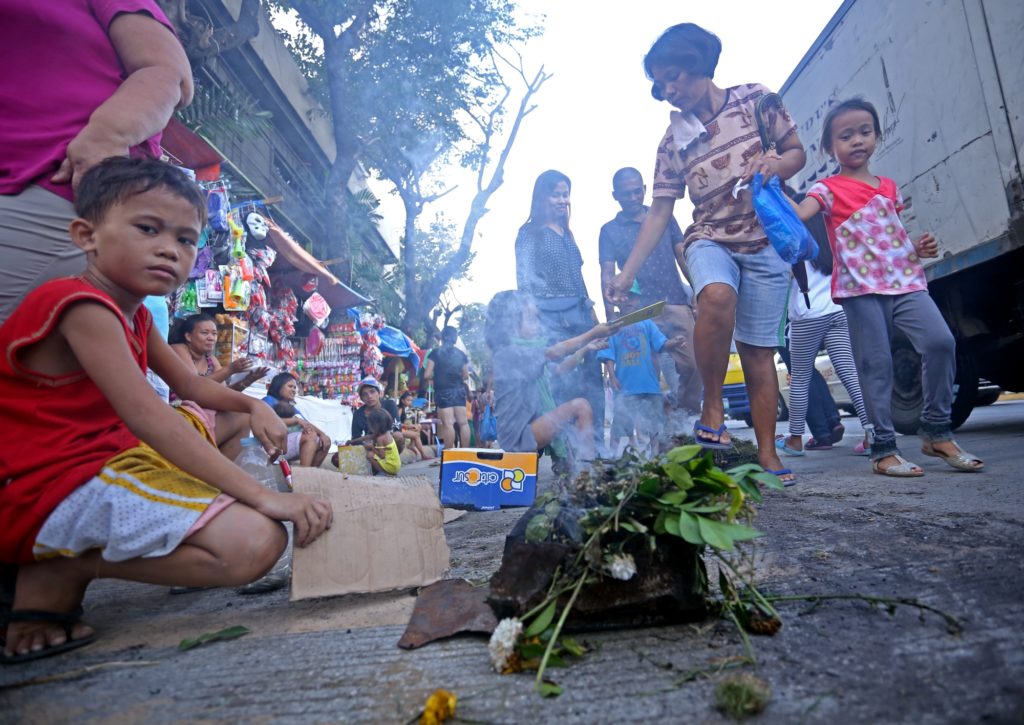
Cemetery visitors like this boy (left photo) and an unidentified man (below) use grass to perform the “palina” ritual during a visit with family at the Calamba Cemetery during last year’s All Saints’ Day observance.
CDN file photo
Evanron Barcelon will not leave the cemetery unless she has done ‘palina’ — a ritual, borne out of superstition.
The ritual, practiced by many Catholics, involves getting immersed in smoke coming from dried leaves, twigs and weeds found inside the cemetery that are burned .
The 31-year-old wife and mother has practiced palina for as long as she could remember.
“Mao man na sa kinaraan. Gikan pa na sa katigulangan nga kailangan ka magpalina human nimog visit sa mga menteryo (It started with my forefathers. You need to do palina after a visit to the cemetery),” said Barcelon.
“Palina” is based on the belief that it could ward off spirits that accompany the living after visiting the dead.
Barcelon said that the ritual is necessary and it should be practiced even by her
children.
“Himoon na siya magpalina inig dayon gawas gikan sa menteryo aron dili manguyog ang mga kalag
(It should be done before going out of the cemetery so the spirits will not go with you),” she explained.
Practical reasons
Archdiocesan Shrine of San Roque in Mambaling parish priest Fr. Mhar Vincent Balili, an expert on church liturgy, said that ‘palina’ traces its roots to the practice of smoking fruit trees to produce early flowers kill pests, and eliminate acidity.
“Kun mobalik ta sa origin ana, kana bitawng ganahan ta magbunga atong mangga paasuhan man? Ang reason ana aron ang acids mangatagak (If we go back to the origin of ‘palina’, it comes from the practice of smoking the mango trees to eliminate acid),” said Fr. Balili.
According to Balili, cemeteries were considered a dirty place and so, in the past, people would use heat from the smoke to kill the germs.
Fr. Balili said that there is no truth to the belief that the ritual could ward off spirits while he stressed the need to educate Catholics on the real reason behind the centuries’ old practice.
“Karon pataka tag rason maong buhaton aron mahibilin ang kalag. Wala mana ang mga kalag sa menteryo (It is a flawed belief. There are no souls in the cemetery),“ Fr. Balili said.
While the practice might not be bad, Fr. Balili said that it could be done for practical reasons.
“Dili man siguro bad. Ang ato lang for them to know the real reason nga dili na tuo-tuo. Palina ta aron ang kalag mahibilin? Tuo-tuo naman na siya and that is superstitious belief (I don’t think it’s entirely bad but people have to know the real reason behind it and it’s not what they think it is.
Warding off spirits is a false belief and that is superstition), “ said Fr. Balili.
He added that if Catholics would choose to practice ‘palina’, it should be simply as a way to ward off germs just like the hand sanitizers that are sold commercially.
Pagan practices
Aside from ‘palina’ Fr. Balili said that there are other practices by the Catholics during All Saints’ and Souls’ Day that should be stopped such as offering food and putting fruits on tombs purportedly to make the spirits happy.
“That’s a pagan practice,” said Fr. Balili.
The priest called on the Catholic faithful to pray for their departed ones instead.
“In order to make the soul happy, let’s not offer food but fervent prayer. That’s what we ought to do,” said Fr. Balili.
Disclaimer: The comments uploaded on this site do not necessarily represent or reflect the views of management and owner of Cebudailynews. We reserve the right to exclude comments that we deem to be inconsistent with our editorial standards.
